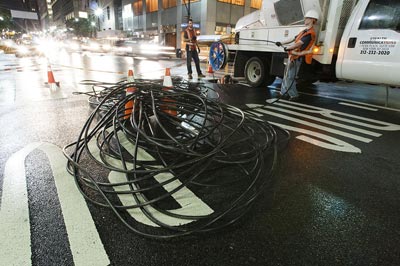
It is sometimes hard to remember how young the Internet really is. Many of the people I know first ventured online (starting with email) around 1995. For the technologically savvy, the Internet was a cool thing to play around with, but it was peripheral to most of the world’s communications, commerce, and governance. Now, in less than one generation, it has become all but impossible to participate fully in many aspects of U.S. society without using the Internet, and this is also true to varying degrees around the world.
The Internet has become a layer of the public square. Because it now mediates our access to the cultural, economic, and political realms, its infrastructure matters. A lot. The structure of the Internet has deep implications for democracy. And that structure is not fixed. New rules being considered by the Federal Communications Commission (FCC)—under a heavy lobbying effort by the giant telecommunications companies—now threaten to change the architecture of the Internet in dangerous ways.
Since the Internet is a component of the public sphere, we should hold it to the ideal of freedom of expression. For this ideal to be fully meaningful, it must include not just the “negative freedom” from interference with the act of speaking, but also the “positive freedom” of access to other listeners and other voices. A democratic ideal of freedom of expression requires the practical ability to participate in public conversation.
The Internet has tremendous democratic potential. Its user-to-user architecture enables people to both speak and listen in ways that one-way-transmission technologies of print and broadcast media do not. Recognizing the role of Internet access in enabling full social participation, the Telecommunications Act of 1996 assigned the FCC the task of monitoring “whether advanced telecommunications capability … [reaches] all Americans in a reasonable and timely fashion.” The Act defined a slow connection as a problem that should be remedied. According to the FCC’s most recent progress report, in 2012, 19 million Americans, mostly in rural areas, did not yet have access to broadband service. Of those living where broadband was offered, only 40% subscribed. Those who did not cited a variety of reasons, including inability to afford it. Still, most of us find one way or another to get online.
Now, the big internet service providers (ISPs)—telecom giants like Time-Warner, Comcast, and Verizon—want to change the price and speed structure. Under the current system, all of the data that any subscriber uploads or downloads is treated equally. When traffic is light, it all gets to its destination equally quickly. When traffic strains the capacity of the network, all data is at equal risk of delay. What the telecom companies would like to do, and what the FCC is poised to let them do, is charge a premium for priority service.
The telecom companies are the gatekeepers to the public square of cyberspace. They supply the physical infrastructure through which we make contact with one another. Those wires and fiber optic cables and wifi signals are valuable to us not as things-in-themselves but as conduits to the people on the other side. The telecom companies, standing between users, are positioned to shake us down, in exchange for letting us reach one another. It is a hugely profitable position to hold, and it would be an even more profitable position under the proposed rule changes. (Their proposal makes for strange bedfellows—you and I, and web-content companies like Netflix and Google, would all be subject to the shakedown.)
The position of gatekeeper is, or should be, a public trust. That is, in theory, why we have the FCC setting rules. If we allow differential pricing, we will be increasing the already staggering power of money, amplifying the voices of those who can pay, and further diminishing the democratic meaning of freedom of expression—understood as equal access for all. Indeed, these rule changes are only being considered because money already buys so much influence. Michael Powell is a former chairman of the FCC and a current big-money lobbyist for the cable industry. Tom Wheeler is the current chairman of the FCC and a former big-money lobbyist for the cable industry. Oh, and Wheeler was also a big contributor to Obama’s presidential campaign before the President appointed him to the FCC.
The FCC is still taking comments on the proposed rule changes via their website (www.fcc.gov/comments) and via e-mail at [email protected] (the deadline has been extended to Friday, July 18). You may not be able to afford a lobbyist to bend Wheeler’s ear in person, but at least your email will be delivered just as fast as the next person’s—for now.
Lawrence Lessig, The Future of Ideas (Random House, 2001); Stephen Breyer, Active Liberty (Alfred A. Knopf, 2005); Federal Communications Commission, Eighth Broadband Progress Report, 2012.
Join us in defending the truth before it’s too late
The future of independent journalism is uncertain, and the consequences of losing it are too grave to ignore. To ensure Truthout remains safe, strong, and free, we need to raise $31,000 in the next 48 hours. Every dollar raised goes directly toward the costs of producing news you can trust.
Please give what you can — because by supporting us with a tax-deductible donation, you’re not just preserving a source of news, you’re helping to safeguard what’s left of our democracy.